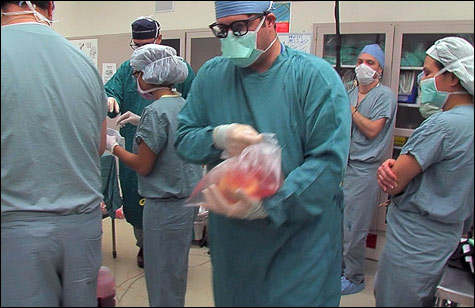
MAKE THAT “TO GO”: The heart itself is a jolly-looking and eminently portable organ. |
We don’t hear too much any more from the people who think heart transplants are a bad idea. Where have they all gone? In its infancy, the procedure was considered an ethical hot potato. On a BBC program called Dr. Barnard Faces His Critics, the late Malcolm Muggeridge challenged South African transplant pioneer Christiaan Barnard with the notion that this surgical swap shop of human hearts was a violation of the Hippocratic Oath, not to mention the sanctity of life. Didn’t it all, worried the God-minded Muggeridge, reduce the body to the status of a “mere carcass”? Dr Barnard scoffed, the audience hissed, and Muggeridge, for some reason, quoted Blake: “A Robin Redbreast in a cage/Puts all heaven in a rage.” (The audience, as he later wrote, “tittered with amusement.”)
The first part of David Grubin’s three-part The Mysterious Human Heart (PBS, October 15 at 9 and 10 pm and October 22 at 9) teaches us that Muggeridge was right about one thing, at least: when it comes to the squelching, indefatigable little bellows that powers our bloodstream, there can be no improvement on nature. Artificial pumps will do the work for a while, but sooner or later you’re going to need a transplant — you’re going to need somebody else’s heart. Hypochondriacs take note: this documentary may leave you in a state of advanced anxiety as to the state of your own plumbing. Certain types of heart disease are more or less asymptomatic: not a hint of a problem until your ticker one day refuses to tock. Grubin’s camera returns again and again to the image of heavy traffic funneling through a highway junction, the cars and trucks as busy as corpuscles: how long, it seems to ask, before the inevitable gridlock?
Beth Bradley, a Connecticut radio journalist, was fit and happy and in the prime of her middle age when she suffered a small heart attack. During the subsequent operation, a catastrophe occurred: one of her coronary arteries was split, and the blood loss left the muscle of her heart fatally impaired. As we enter her story, Beth is anchored to a mechanical heart the size of a suitcase, waiting for a transplant, too weak to climb the stairs to the bedroom she shares with her husband. The machine wheezes crabbily at her side: “I’d do anything to have my own quiet heart back,” she says. With every day that passes, as the machine sabotages her immune system, the possibility of a successful transplant diminishes.
Bob Cunningham seems at first a more typical transplant candidate: a stolid sexagenarian Long Islander with a home-improvement business and a (smaller) mechanical heart. But Bob’s patience with the whole business and his fortitude as his chances ebb are exceptional — he’s saintly in the most hard-assed way. Someone ODs and a new heart is available. Then the new heart arrests, and it’s back to square one. Somebody dies in a car crash in North Carolina, and this time Bob is opened up to receive the still-living heart even as the “harvest team” is packing it in ice and rushing it to New York. The heart itself, in its sheath of yellow fat, is a jolly-looking and eminently portable organ; it’s remarkable to think there could ever have been a religious objection to this. “I’ll always respect who the heart belonged to before me,” says Bob when it’s all over. “So I try a little harder, to be worthy of what I got.” The gratitude and the humility in his voice suggest that life post-transplant may have a sanctity undreamed of in the devotions of Malcolm Muggeridge.